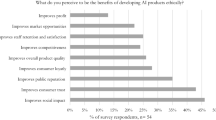Abstract
Because AI is gradually moving into the position of decision-maker in business and organizations, its influence is increasingly impacting the outcomes and interests of the human end-user. As a result, scholars and practitioners alike have become worried about the ethical implications of decisions made where AI is involved. In approaching the issue of AI ethics, it is becoming increasingly clear that society and the business world—under the influence of the big technology companies—are accepting the narrative that AI has its own ethical compass, or, in other words, that AI can decide itself to do bad or good. We argue that this is not the case. We discuss and demonstrate that AI in itself has no ethics and that good or bad decisions by algorithms are caused by human choices made at an earlier stage. For this reason, we argue that even though technology is quickly becoming better and more sophisticated a need exists to simultaneously train humans even better in shaping their ethical compass and awareness.
Similar content being viewed by others
References
CEOs: AI will have larger impact than the internet. https://www.marketingcharts.com/customer-centric/analytics-automated-and-martech-107328 (2019). Accessed 1 June 2021
Haesevoets, T., De Cremer, D., Dierck, K., Van Hiel, A.: Human-machine collaboration in managerial decision making. Comput. Hum. Behav. (2021). https://doi.org/10.1016/j.chb.2021.106730
De Cremer, D., Kasparov, G.: AI should augment human intelligence, not replace it. Harvard business review. https://hbr.org/2021/03/ai-should-augment-human-intelligence-not-replace-it (2021). Accessed 1 June 2021
De Cremer, D.: What does building a fair AI really entail? Harvard business review. https://hbr.org/2020/09/what-does-building-a-fair-ai-really-entail (2020). Accessed 1 June 2021
Sankaran, V.: Military drones may have attacked humans for first time without being instructed to, UN report says. Independent. https://www.independent.co.uk/life-style/gadgets-and-tech/drone-fully-automated-military-kill-b1856815.html (2021). Accessed 1 June 2021
Machines are indifferent, we are not: Yann LeCun’s Tweet sparks ML bias debate. https://analyticsindiamag.com/yann-lecun-machine-learning-bias-debate/ (2020). Accessed 1 June 2021
Simonite, T.: Google offers to help others with the tricky ethics of AI. https://www.wired.com/story/google-help-others-tricky-ethics-ai/ (2020). Accessed 1 June 2021
Grant, N., Bass, D., Eidelson, J.: Google Turmoil exposes cracks long in making for top AI watchdog. Bloomberg. https://www.bloomberg.com/news/articles/2021-04-21/google-ethical-ai-group-s-turmoil-began-long-before-public-unraveling (2021). Accessed 1 June 2021
De Cremer, D., Moore, C.: Toward a better understanding of behavioral ethics in the workplace. Annu. Rev. Organ. Psych. Organ. Behav. 7, 369–393 (2020)
Author information
Authors and Affiliations
Corresponding author
Ethics declarations
Conflict of interest
On behalf of all authors, the corresponding author states that there is no conflict of interest.
Additional information
Publisher's Note
Springer Nature remains neutral with regard to jurisdictional claims in published maps and institutional affiliations.
Rights and permissions
About this article
Cite this article
De Cremer, D., Kasparov, G. The ethical AI—paradox: why better technology needs more and not less human responsibility. AI Ethics 2, 1–4 (2022). https://doi.org/10.1007/s43681-021-00075-y
Received:
Accepted:
Published:
Issue Date:
DOI: https://doi.org/10.1007/s43681-021-00075-y




